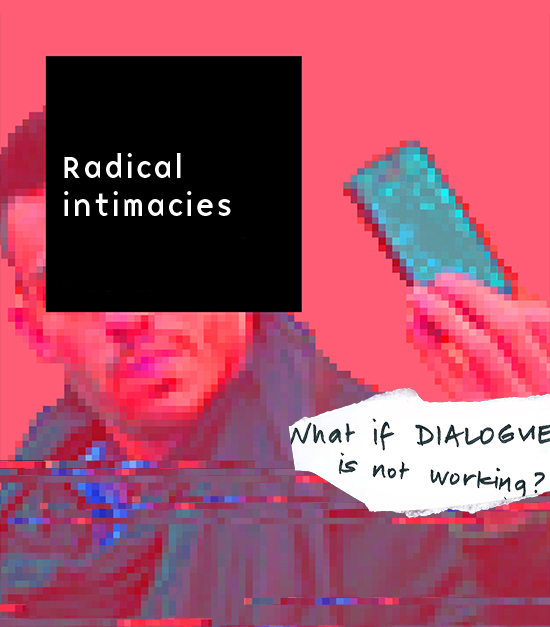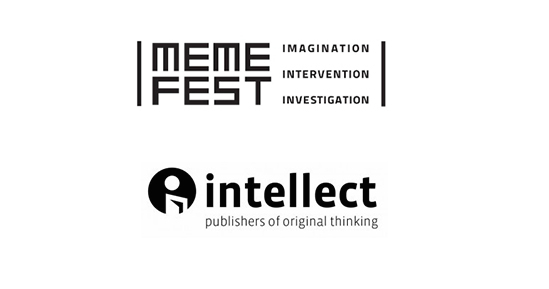CALL FOR CONTRIBUTIONS to new Memefest book RADICAL INTIMACIES: Extradisciplinary Investigations in Making Things Public

We are very excited to announce that we are working on our next book in the Memefest "Interventions" book series in partnership between Memefest and Intellect Books UK, Publishers of Original Thinking! http://www.intellectbooks.co.uk/
++++++++++++++++++++++++++++++++++++++++++++++++++
CALL FOR CONTRIBUTIONS to the book RADICAL INTIMACIES: Extradisciplinary Investigations in Making Things Public
++++++++++++++++++++++++++++++++++++++++++++++++++
We are inviting you to submit essays/papers/ visual texts, which will be published as book chapters for our upcoming book RADICAL INTIMACIES: Extradisciplinary Investigations in Making Things Public.
Contributions should be submitted in two stages:
1. Please submit an abstract not shorter than 400 words and add some information about yourself by June 20, 2020. If you are submitting a visual text send us a few samples and a rationale.
Selected authors will be informed by June 25, 2020 and invited to submit full text.
2. Invited authors will need to submit full text by November 25, 2020.
Send all materials to radicalintimacies@memefest.org
Format: The format is very open. We welcome academic texts as well as essays. We also welcome visual essays or more experimental forms of writing/ storytelling. Our main interest lies in originality, the strength of the argument in relation to the conceptual outlines of the book, and contribution to knowledge of Radical Design and Communication.
Length: max of 5500 words not including references and abstract. If you are submitting a visual text, keep it to max of 10 pages.
This book will continue Memefest’s tradition of critical independent thought and practice, and of connecting different cultures of knowledge production - especially those of academics, practitioners and activists. The profile of people close to our ideas might be described as theorist punks, activists, curious researchers, radical educators and practical intellectuals.
The book will mainly draw work from Memefest’s international network of engaged thinkers and practitioners, but is open to other contributors. The book will put special emphasis on the relations between theoretical practice and the making of design and communication. Curated selections from Memefest’s Festival Friendly Competition will be included.
Disciplinary boundaries will be pushed, critique and imagination explored, foundations rethought, ideologies debunked and an alternative scene further developed. The culture we want to nurture is highly collaborative through joint thinking, making and discussing.
Oliver Vodeb is the principal editor and curator of the Memefest book series.
//////////////////////////////////////////////////////////////////////////////////////
Conceptual outlines of the book: RADICAL INTIMACIES: Extradisciplinary Investigations in Making Things Public
//////////////////////////////////////////////////////////////////////////////////////
Dialogue and Intimacy
Dialogue is tirelessly presented as ‘the’ solution to the problems of our times – in art, war, love, democracy and even in the workplace. In fact, dialogue has been central to the ethos of Memefest since its inception back in 2002. But what if dialogue is not working?
Dialogue is understood as the most intensive form of communication. Its intimacy is profound. It demands most of our attention and while our individual participation in dialogue is crucial for a democratic society, what really matters is what happens in the commons as this is the true result of dialogue. But most of the commons are dispersed and atomized. Many of the manifestations of dialogue are short term due to the nature of the digital platforms generating large parts of our daily interactions. Communicative capitalism wants to constantly increase the quantity and speed by which our interactions are happening. Quality and meaning do not really matter. It is rare and difficult to be able to establish a relation of intimacy, a relationship with another person, a group, or a subject built on trust, understanding, affection, familiarity, deep knowledge, commitment, care and collaboration - even more so if this relationship is meant to exist in opposition to the dictates of capitalism and managerialism. A radical intimacy.
For Habermas, a critical publicness depends on the development and expansion of semiformal institutions, dialogic places like the café or the salon as well as circulating print media; the notion of the democratic public sphere thus made collective intimacy a public and social ideal, one of fundamental political interest. Without it the public’s role as critic could not be established (Berlant). While the semiformal institutions facilitating intimacy (with various degrees) still exist and commercial entertainment still clashes with the critical demands of the democratic culture, the desire for entertainment taken for pleasure is many times enforced through what can be described as weaponized design - a process that allows or even facilitates harm of users within the limits of a designed system. Such environments are designed to be anti-dialogic. They simulate experiences of intimacy in order to capitalize on them.
Intimacy and addiction
Intimacy and addiction are commonly related in situations of personal hardship and systemic colonization. Who are the most vulnerable people in times of Covid-19? The poor, people of color and indigenous people. What is the level of dialogue between them and the dominant culture? What is their relation to capitalism? And why are their social situations of intimacy in everyday life largely determined with the presence of addictive food (think of family meals and Domino Pizza + Coca Cola), illegal or legal drugs (think of social situations in which illegal drugs are being consumed or legal drugs enable people to go through the stress of the daily performance at jobs) and mobile technologies (just think of how often is a mobile phone taken into bed)?
9/11 gave rise to surveillance capitalism. Will Covid-19 and its global mental health effects open a new era of the pharmakon?
The installation of fluorescent green and red lights on the pavements in front of street crossings in Melbourne, Australia, which aim to alert people glued to their mobile phone screens that there is a red light and one should not cross the street, is a significant manifestation of regulation of addiction through design. Not long ago we would look at this as an art project, today it is part of our officially designed infrastructure.
Intimacy and communication
To care for something or someone means we have to give our attention to this ‘something’ or ‘someone’. Advertising seeks to consume our attention, even when we have none left. What is the relation between advertising and care? What happens to our ability to care, if our
attention is more and more dispersed, and our attention spans shorter and shorter?
Is the ‘social’ that radical politics imagine different from the ‘social’ social media refers to? It seems our communication media are designing the ‘social’ primarily as a space for representing and being represented. “Social media makes the shift from representation to participation very clear: people participate in the launch and life span of images, and indeed their life span, spread and potential is defined by participation.” (Steyerl) Representing and being represented are fundamental to dialogue. But what is actually left of dialogue in everyday life when the potentials for intimacy through participation are inscribed in algorithmic governance of automated media?
The current erosion of institutions of trust go hand in hand with the growing cultures of eroding criteria of quality when it comes to knowledge. Fake news and the discreditation of views not in line with a particular position as fake news are not that far from the rise of one idea merchants, hashtag fiddlers and small bureaucrats of the type “never says anything but acts as s/he knows everything.
Intimacy, capitalism, Coronavirus
Not unlike a media virus, the Coronvirus exposes hidden things when spreading. Each society creates its own vulnerabilities. Pandemics don’t happen as a coincidence without warning signs. A corrupt political class, dismantled bureaucracy, heartless economy and a society overpowered by disconnected managerialism are now being exposed for what they are. The commons like public education and health systems are in a bad state. Perhaps now more than at any other time in our lives we need to think about intimacy in relation to the private and the public. Dialogue can be a powerful tool to do this.
Do we need to think about capitalism after coronavirus and not just capitalism? How will capitalism use this situation to further compromise intimacy? Is it possible to have intimacy with social distancing? Are new forms of intimacy developing and how can we use feminist knowledge right now? What forms of pseudo intimacy are being generated? And isn’t social distancing actually already capitalism’s key strategy for a long time?
Extradisciplinary Investigations by design
Understanding is at the core of intimacy, be it with a person, community or subject. The intimacy with radical knowledge could be established in institutions, even as universities are burdened with managerialism in the service of destruction of knowledge. But universities still have a lot to offer. Like a web of pirate islands here and there, critical academics are scattered around, and urgent knowledge is produced. And the pirate web goes further, outside of academia and its disciplines. Radical practitioners, practical intellectuals in design and communication and other fields have shown for decades that it is possible to operate in the cultural public sphere without just serving the status quo. Social movements emerging from critical, marginal positions, the parts of our society which are the core of pushing for social change, keep on fighting and are inspiring us all. Here we see a critical connection. The extradisciplinary methodology nurtured by Memefest is connecting universities, practitioners and social movements in a reflexive and circular manner, returning back to the initial discipline with the aim to change it. In this way institutional critique is developed, meaningful practice enabled, direct action nurtured and critical knowledge produced. Everyone learns from everyone and can potentially be changed in the process. In this process radical intimacies and dialogue are directly connected with friendship, collaboration and pleasure.
We are excited to receive your contributions and are looking forward to collaborate with you!
Our point of departure is design as a central domain of thought and action concerned with the meaning and production of sociocultural life. We are interested in design that aims to operate outside the existing social orders and paradigms and is about imagining and building new worlds and social relations. Media and communication studies and critical sociology are for us in connection to design on the same plane. But by absolutely any means we are inviting other disciplines to contribute to this mix. Philosophy, art, education, photography, economics, law, biology, culinary arts, computer science, pirate research and more. And remember: we are seeking contributions from academics, practitioners and activists. Whatever your background is, your work should relate to the ideas of Radical Design and Communication and the extradisciplinary investigation.
If you have any questions send us an email to: radicalintimacies@memefest.org
For a greater sense of our work and book series, please check out our previous books in the Intervention series: InDEBTed to Intervene: http://www.memefest.org/en/indebtedtointervene/ and
Food Democracy: http://www.memefest.org/en/fooddemocracy/

Comments
3 years, 12 months
3 years, 11 months
https://charleseisenstein.org/essays/the-coronation/
3 years, 11 months
3 years, 11 months

To comment, please create a Memefest account, it will take you only 2 minutes! Login here if you already have one.